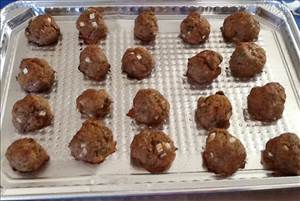Metformin vs Ovasitol: Which is Better for PCOS Management?
Compare Metformin and Ovasitol for PCOS: Learn the benefits, side effects, and effectiveness of each treatment option for managing symptoms.
This recipe includes superfoods such as:
Lemons can help to prevent oxidative damage to the body, which women with PCOS are often susceptible to. Lemons are also rich in vitamin C, flavonoids, and other antioxidants. They can potentially support the immune system and have other health benefits. Lemons also have a low glycemic index, so they should not cause a rapid rise in blood sugar when consumed in natural form.
One 10-pound turkey, neck and gizzards reserved
2 tablespoons kosher salt
4 sprigs fresh oregano
4 sprigs fresh thyme
1 head garlic, halved through its equator
1 lemon, quartered
1 fennel bulb, quartered
1 onion, peeled and quartered
1/4 cup picked fennel fronds
1 stick (8 tablespoons) unsalted butter
1/4 cup chicken or turkey stock (preferably homemade), or water
The day before roasting, rinse the turkey inside and out with cold water, set on a clean kitchen towel and pat dry. Sprinkle the turkey inside and out with the salt. Wrap the turkey in plastic wrap and refrigerate, about 24 hours.
Remove the turkey from the refrigerator 1 to 2 hours prior to roasting to bring to room temperature.
Place an oven rack on the lowest rung and preheat the oven to 425 degrees F.
Place a few sprigs of the oregano and thyme, a few cloves of the garlic and a quarter of the lemon in the turkey's neck cavity. Wrap the neck skin over and around the cavity to enclose the ingredients. Place half of the remaining oregano, half of the remaining thyme, half of the remaining garlic, 2 lemon quarters, half of the fennel, half of the onion and all the fennel fronds in the turkey's body cavity. Place the turkey, breast-side-up, on a rack set into a large roasting pan. Fold the wings and tuck the tips underneath the turkey.
Melt the butter in a saucepan over medium heat, and then let cool.
Fill a pot with the stock. Add the remaining oregano, thyme, garlic, 1 quarter lemon, fennel and onions to the pot. Bring the stock mixture to a boil, reduce the heat so that the liquid simmers and continue to cook at a low simmer, about 10 minutes. Remove the pot from the heat and allow to cool slightly.
Soak a double layer of cheesecloth big enough to cover the turkey in the cooled butter and drape over the breast and legs of the turkey. Pour the stock mixture over the bird, pushing the pieces of vegetable and herbs into the bottom of the roasting pan. Add the reserved neck and gizzards to the bottom of the roasting pan.
Place the turkey in the oven and roast, about 45 minutes. (There will be the distinct possibility of smoke depending on how clean your oven is). Turn the temperature down to 375 degrees F, and continue to roast until an instant-read thermometer inserted into the center of a thigh registers 160 degrees F, 15 to 20 minutes (removing the cheesecloth for the final 10 minutes to brown, if needed). Remove the turkey from the oven and allow to rest before carving, about 20 minutes.

Serving Size: 6
| Amount Per ONE Serving | ||
|---|---|---|
| Calories 0 kcal | ||
| Fat 0 g | ||
| Carbohydrate 0 g | ||
| Protein 0 g | ||
Managing PCOS can be challenging, but you don't have to do it alone. Join our supportive community to connect with others who understand what you're going through, share tips, and get encouragement. Here's how you can get involved:
Subscribe to our Newsletter: Receive PCOS-friendly recipes, tips, research updates, and more delivered straight to your inbox. Stay informed and empowered with the latest information and support.
Join our Telegram Channel: Stay updated with the latest tips and advice on managing PCOS.
Follow us on Facebook: Engage with our community, participate in discussions, and get support from others.
Break the cycle with the PCOS Meal Planner - your personalized guide to eating better, feeling better, and managing PCOS symptoms. Take control today!

Forget the frustrating cycle of weight loss attempts, endless medications, and living in discomfort. Introducing the PCOS Meal Planner. A meal planning guide that goes beyond temporary fixes to offer a comprehensive strategy, empowering you to ignite a transformation towards lasting health and happiness. Step into a world where you control your PCOS, not the other way around.
Unlock Your PCOS Freedom Now.
Compare Metformin and Ovasitol for PCOS: Learn the benefits, side effects, and effectiveness of each treatment option for managing symptoms.
Discover effective supplements for PCOS insulin resistance. Learn about evidence-based options to help manage insulin levels and support hormonal balance.
Master low GI meal prep for PCOS with our comprehensive guide. Learn time-saving tips and strategies for preparing blood sugar-friendly meals.
Discover delicious PCOS diet recipes that help manage symptoms through hormone-balancing ingredients and easy meal preparation methods.
Discover practical PCOS-friendly food swaps that make healthy eating easier. Learn simple switches to better manage your PCOS symptoms.
Discover PCOS-friendly sauces and condiments that won't spike blood sugar. Learn which store-bought options are safe and how to make healthier versions at home.
Discover if Weight Watchers can help manage PCOS symptoms. Learn the benefits and drawbacks of WW for PCOS weight management.
Discover how the HMR Program impacts PCOS management: learn the benefits and drawbacks of this structured weight loss approach for better health.
Discover PCOS-friendly hiking snacks that keep your energy levels stable and symptoms in check. Learn what to pack and how to prepare for your outdoor adventures.